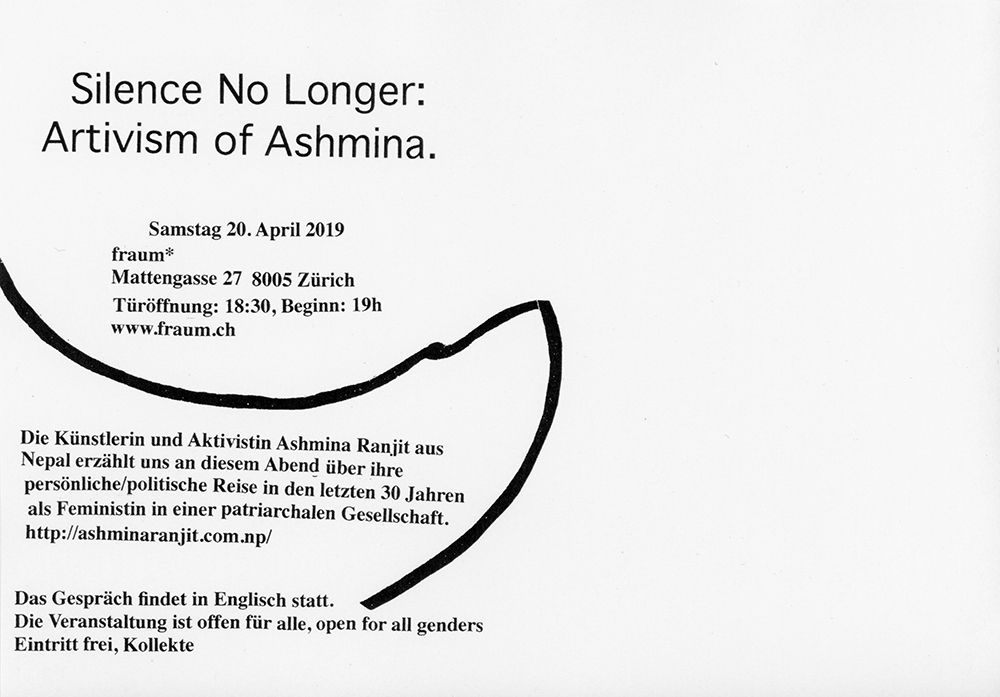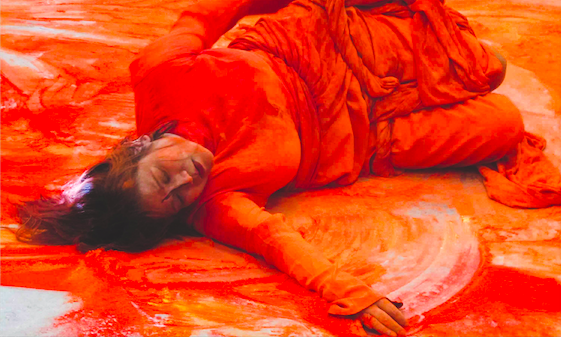Veranstaltungen im Überblick
- 1.4.2019 (Mo), 14-18h, reserviert für Interview Frauen*streik-Beilage
- 3.4.2019 (Mi), ab 19h, reserviert für lucify.ch
- 4.4.2019 (Do) 18:30 Uhr, reserviert für Krąg Polskich Kobiet (Kreis polnischer Frauen)
- 7.4.2019 (So), 16 Uhr, FEMLITCLUB. wir sprechen über aglaja veteranyis „warum das kind in der polenta kocht“. fragen? > mail an femlitclub@posteo.ch
- 8.4.2019 (Mo), 17:30h, reservier für fem! 3Zahlen-Club
- 9.4.2019 (Di), ab 18:30h, reserviert für Bla*Sh
- 11.4.2019 (Do), 18:30h, genderqueeres Treffen, romanescos.ch
- 12.4.2019 (Fr), ab 20h, frau*m FRÜHLINGSFEST, Bar, Party, Motto: Historische Frauenfiguren, your future selves, Heldinnen* ??♀️??♀️? ??? ? ? ? ? ?
- 13.4.2019 (Sa) 11-14h, reserviert für Zerilli-Lesegruppe
- 15.4.19 (Mo), 17-21h, LeLa Kollektiv – eine Stadt voller Klitoris
- 16.4.19 (Di), 17-21h, LeLa Kollektiv – eine Stadt voller Klitoris
- 17.4.19 (Mi), 17-21h, LeLa Kollektiv – eine Stadt voller Klitoris
- 18.4.19 (Do), 19h, reserviert für lucify.ch
- 19.4.19 (Fr), 18h, reserviert für Redaktionskollektiv Frauenstreik
- 20.4.19 (Sa), 18:30h, Silence No Longer: Artivism of Ashmina. Gespräch mit Ashmina Ranjit
- 26.4.19 (Fr), 14-17h, reserviert für Interview
- 26.4.19 (Fr), 19h, reserviert für Sitzung Redaktion Streikbeilage Solidarität
******************************************************************************
12.4.2019 (Fr), ab 20h, frau*m FRÜHLINGSFEST, Bar, Party, Motto: Historische Frauenfiguren, your future selves, Heldinnen* ??♀️??♀️? ??? ? ? ? ? ?
******************************************************************************
15./16./17.4.19 (Mo), 17-21h, LeLa Kollektiv – eine Stadt voller Klitoris
******************************************************************************
20.4.19 (Sa), 18:30h, Silence No Longer: Artivism of Ashmina. Gespräch mit Ashmina Ranjit
Die Künstlerin und Aktivistin Ashmina Ranjit aus Nepal erzählt uns an diesem Abend über ihre persönliche/politische Reise in den letzten 30 Jahren als Feministin in einer patriarchalen Gesellschaft.
Türöffnung: 18:30, Beginn: 19h
Das Gespräch findet in Englisch statt.
Die Veranstaltung ist offen für alle, open for all genders
Eintritt frei, Kollekte
Zitate über ihre Arbeit aus dem Vorwort zum Buch Silence No Longer von Laura Kunreuther:
‘Ashmina’s performances are always in dialogue with whatever is happening in the moment, politically, socially, environmentally. While varied, the themes Ashmina engages derive from her feminism, her interest in care for the environment and humanity, in her leftist, humanist politics. ‘Activism’ comes through asking people to stop, confront, and reflect on the status quo.’
‘Ashmina has transformed from a print-maker, painter, and visual artist into a performance artist who uses the city, citizens, and the urban landscape as her media. These changes in medium echo her transformation from a singular artist to an artist-collaborator.’
‘To be sure, Ashmina’s work emerges from her experience as a Nepali and Newari woman, born and raised in Kathmandu in a particularly volatile and transformative moment in Nepal’s history. But it would be a mistake to understand her as a ‘Nepali artist’ or an ‘artist of Nepal’. Instead, Ashmina’s work provides the opportunity for people from very different backgrounds to come together, to observe, think, and create with one another. In this process, she asks us to confront and utter unspoken truths that define the specificity of life, and the work of emancipation, everywhere.’


